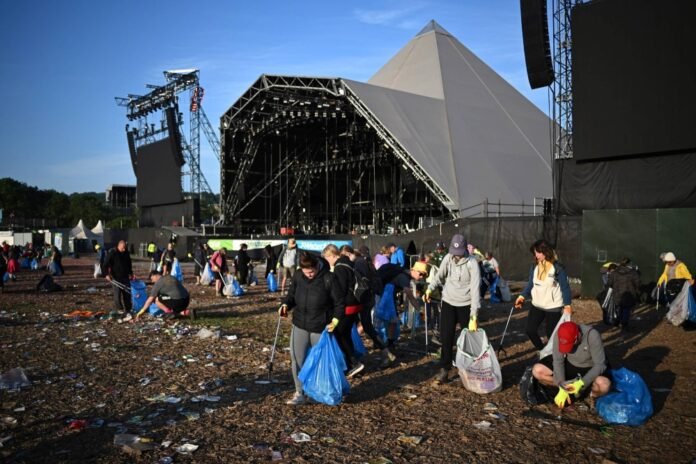Three planes, 270 tons of equipment, 800 square meters of stage: the figures at Madonna’s enormous free concert in Rio in May sounded like they came from another era.
Nowadays, megastars tend to claim a smaller footprint.
Coldplay, who recently performed at Glastonbury Festival in the UK, recently announced that they have reduced the carbon emissions of their world tour by 59 percent compared to their last tour in 2016-2017.
They have taken innovative measures, such as solar panels and even a special dance floor that generates electricity from the movements of the audience.
Critics point out that they are still flying planes and there was particular outrage when they announced a partnership with Finnish oil giant Neste in 2022.
Although Neste promised to help them use sustainable biofuels, campaign group Transport and Environment said Coldplay were being used by the oil company as “useful idiots for greenwashing”.
While the total impact is difficult to measure, a 2010 study by Oxford University’s Environmental Change Institute estimated that UK industry alone generates 540,000 tonnes of carbon emissions each year.
Climate organization Clean Scene discovered that the top 1,000 DJs took no fewer than 51,000 flights in 2019, which equates to 35,000 tons of CO2 emissions.
Climate commitments
As a result, all major festivals now have climate pledges and initiatives, from composting and carpooling programs at Coachella in California to using renewable energy at Glastonbury.
One festival that has taken the lead in this is We Love Green in Paris, as the name suggests.
Some 110,000 festival-goers attended last month’s event to see artists including Sza, who traveled “almost without gear,” according to Marianne Hocquard, the festival’s head of sustainable development.
According to her, this is because the festival ensures that artists have the necessary equipment and that energy limits are set for performances.
Others have taken radical measures: this year’s Bon Air festival in Marseille cancelled DJ I Hate Models after it emerged he would be arriving by private jet.
Nowadays, many events encourage their visitors to use greener modes of transport.
We Love Green has partnered with the French Cycling Federation to organise convoys of bikes this year. According to the organisation, 14 per cent of ticket holders came on two wheels, despite the bad weather. Last year, that was just eight per cent.
But there is a limit to what can be done.
When Taylor Swift played in Paris in May, the mayor’s office reported an increase in the number of private jets arriving at local airports.
Private jet operators are using entertainment events such as festivals or the 2024 European Football Championship to increase their revenue.
A recent press release from private jet company KlasJet said little about the climate: “When you travel to a great event like Euro 2024, the last thing you want is for your experience to be ruined by a delayed flight.”



